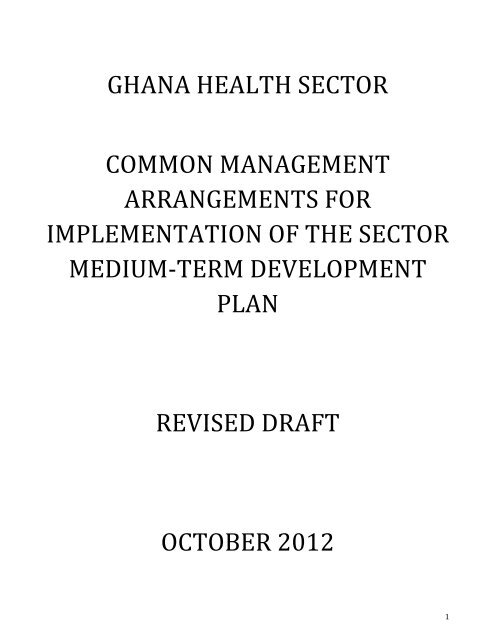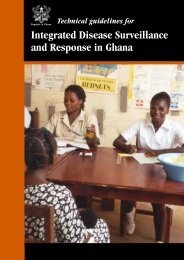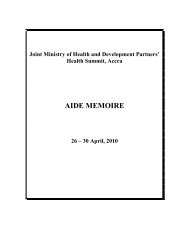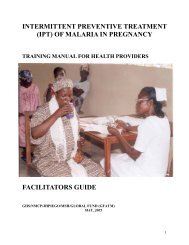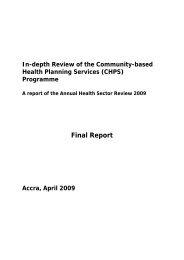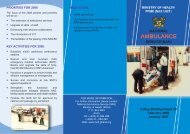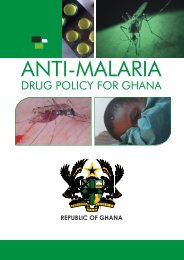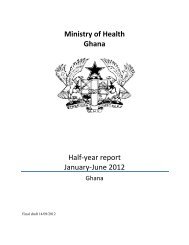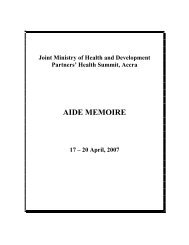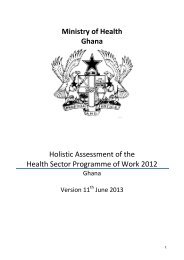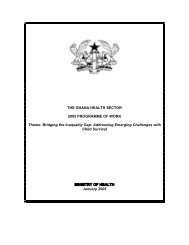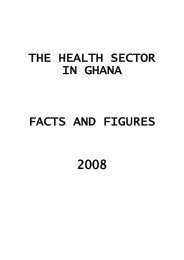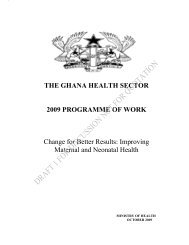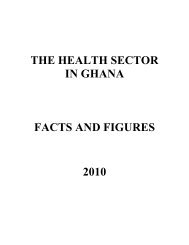REVISED CMA III - Ministry of Health
REVISED CMA III - Ministry of Health
REVISED CMA III - Ministry of Health
Create successful ePaper yourself
Turn your PDF publications into a flip-book with our unique Google optimized e-Paper software.
GHANA HEALTH SECTOR <br />
COMMON MANAGEMENT <br />
ARRANGEMENTS FOR <br />
IMPLEMENTATION OF THE SECTOR <br />
MEDIUM-‐TERM DEVELOPMENT <br />
PLAN <br />
<strong>REVISED</strong> DRAFT <br />
OCTOBER 2012 <br />
1
Table <strong>of</strong> Contents <br />
Abbreviations and Acronyms ........................................................................................................................................... 3 <br />
1. Introduction ........................................................................................................................................................................ 5 <br />
2. Coordination and Dialogue ........................................................................................................................................... 8 <br />
3. Planning and Budgetting ............................................................................................................................................ 15 <br />
4. Performance Monitoring ............................................................................................................................................ 18 <br />
5. Disbursement and Financial Management ......................................................................................................... 23 <br />
6. Procurement and Logistics ........................................................................................................................................ 27 <br />
7. Audit .................................................................................................................................................................................... 29 <br />
2
Abbreviations and Acronyms <br />
BCA Basic Cooperation Agreement <br />
BMC <br />
CCM <br />
CHAG <br />
CIMU <br />
<strong>CMA</strong> <br />
CSOs <br />
DHIMS <br />
DPs <br />
GAC <br />
GFATM <br />
G-‐HAP <br />
GHS <br />
G-‐JAS <br />
GoG <br />
HQ <br />
IALC <br />
ICCs <br />
IGF <br />
MDAs <br />
MDBS <br />
M&E <br />
MOFEP <br />
MOH <br />
MoU <br />
MTEF <br />
Business Management Centre <br />
Country Coordinating Mechanism <strong>of</strong> the Global Fund <br />
Christian <strong>Health</strong> Association <strong>of</strong> Ghana <br />
Capital Investment Management Unit <strong>of</strong> the <strong>Ministry</strong> <strong>of</strong> <strong>Health</strong> <br />
Common Management Arrangement <br />
Civil Society Organisations <br />
District <strong>Health</strong> Information Management System <br />
Development Partners <br />
Ghana Aids Commission <br />
Global Fund for AIDS, Tuberculosis and Malaria <br />
Ghana Harmonisation Action Plan <br />
Ghana <strong>Health</strong> Service <br />
Ghana Joint Assistance Strategy <br />
Government <strong>of</strong> Ghana <br />
Headquarters <br />
Inter-‐Agency Leadership Committee <br />
Inter-‐Agency Coordinating Committees <br />
Internally Generated Funds <br />
Ministries, Departments and Agencies <br />
Multi-‐Donor Budget Support <br />
Monitoring and Evaluation <br />
<strong>Ministry</strong> <strong>of</strong> Finance and Economic Planning <br />
<strong>Ministry</strong> <strong>of</strong> <strong>Health</strong> <br />
Memorandum <strong>of</strong> Understanding <br />
Medium Term Expenditure Framework <br />
3
NDPC <br />
NGOs <br />
NHIA <br />
NHIF <br />
OECD <br />
PAF <br />
PEPFAR <br />
PFM <br />
PIUs <br />
POW <br />
PPA <br />
PBU <br />
PPME <br />
SBS <br />
SMTDP <br />
SWAp <br />
SWG <br />
TB <br />
VFM <br />
National Development Planning Commission <br />
Non-‐Governmental Organisations <br />
National <strong>Health</strong> Insurance Authority <br />
National <strong>Health</strong> Insurance Fund <br />
Organisation for Economic Cooperation and Development <br />
Performance Assessment Framework <br />
US President’s Emergency Plan for AIDS Relief <br />
Public Financial Management <br />
Project Implementation Units <br />
Programme <strong>of</strong> Work <br />
Public Procurement Authority <br />
Budget Unit <strong>of</strong> the Policy Planning, Monitoring and Evaluation Directorate <br />
Policy Planning, Monitoring and Evaluation <br />
Sector Budget Support <br />
Sector Medium Term Development Plan <br />
Sector Wide Approach <br />
Sector Working Group <br />
Tuberculosis <br />
Value for Money <br />
4
1. Introduction <br />
Background <br />
This Common Management Arrangement sets out arrangements for effective collaboration and <br />
coordination within the health sector. It describes interrelationships within the health sector and <br />
partners at all levels. It is aimed at ensuring effective achievement <strong>of</strong> the sector program <strong>of</strong> work. <br />
The <strong>CMA</strong> recognizes institutional legislation, mandates and roles <strong>of</strong> all sector partners, the <br />
coordination and collaboration arrangements set out in the <strong>CMA</strong> aim to complement them. The <br />
<strong>CMA</strong> is guided by the sector’s legislation, policies and procedures as well as key developments in <br />
the international and national aid architecture as reflected in the following – the Ghana <strong>Health</strong> <br />
Services and Teaching Hospitals Act 525, 1996; the National <strong>Health</strong> Insurance Act 650, 2003; the <br />
Financial Administration Act 654, 2003; and Regulations 2004; the Accounting, Treasury and <br />
Financial Rules and Regulations; the sector annual Planning Guidelines; the Paris Declaration on <br />
Aid Effectiveness; the Accra Agenda for Action; the Ghana Aid Policy; the Ghana Harmonisation <br />
Action Plan ( G-‐HAP ); the Ghana Joint Assistance Strategy ( G-‐JAS ) and the sector Aide Memoire. <br />
The Common Management Arrangement <strong>III</strong> is different from <strong>CMA</strong> I and II because <strong>of</strong> the evolving <br />
institutional reforms and decentralisation between MOH and its agencies; an increasing need to <br />
involve a larger group <strong>of</strong> stakeholders such as the private sector and civil society in the sector <br />
planning, implementation and monitoring processes; and changes in the way DPs work following <br />
the signing <strong>of</strong> the Paris Declaration on Aid Effectiveness and development <strong>of</strong> the Ghana Joint <br />
Assistance Strategy. <strong>CMA</strong> <strong>III</strong> also reflects the changing financing architecture <strong>of</strong> the health sector -‐ <br />
the National <strong>Health</strong> Insurance Fund becoming a significant funding source; the shift to sector <br />
budget support by the health partners rather than the <strong>Health</strong> Fund, and reduction in the <strong>Health</strong> <br />
Fund relative to earmarked funds. <br />
Under the guidance <strong>of</strong> the National Development Planning Commission (NDPC), the <strong>Ministry</strong> <strong>of</strong> <br />
<strong>Health</strong> together with other MDAs is preparing a new Sector Medium Term Development Plan <br />
2010-‐2013 (SMTDP), which will replace the current 5-‐year Programme <strong>of</strong> Work (POW <strong>III</strong>). The <br />
SMTDP will be aligned with the overall National Medium-‐Term Development Policy Framework <br />
(2010-‐2013) which has been developed with a view to improving the living standards <strong>of</strong> people <br />
living in Ghana. While the SMTDP sets out the direction for the sector for the next four years in <br />
terms <strong>of</strong> policy and key implementation strategies, the <strong>CMA</strong> focuses on the collaboration <br />
arrangements which need to be in place in the sector for the policies outlined in the SMTDP to be <br />
successfully implemented. <strong>CMA</strong> <strong>III</strong> will support implementation <strong>of</strong> the Sector Medium-‐Term <br />
Development Plan. <br />
All stakeholders that support the sector with significant activities and resources will be expected <br />
to comply with the arrangements set out in the <strong>CMA</strong>. On an annual basis, in line with the <br />
5
principles <strong>of</strong> mutual accountability, all sector partners will undergo a peer review to assess their <br />
level <strong>of</strong> compliance with the <strong>CMA</strong>”s key principles. The review will be coordinated by the PPME <br />
<strong>of</strong> MOH and the results will be presented at the first Business Meeting for the year. Sector <br />
partners will be expected to take corrective measures to address any deviations identified in this <br />
reviews. Compliance with the <strong>CMA</strong> will also be encouraged through dialogue. <br />
Purpose <br />
The Common Management Arrangement sets out arrangements for effective collaboration and <br />
coordination within the health sector. It describes interrelationships, roles and responsibilities <br />
within the health sector and with partners at all levels. It is aimed at ensuring effective <br />
achievement <strong>of</strong> the sector program <strong>of</strong> work. The <strong>CMA</strong> recognizes institutional legislation, <br />
mandates and roles <strong>of</strong> all sector partners -‐ the coordination and collaboration arrangements set <br />
out in the <strong>CMA</strong> aim to complement them. The <strong>CMA</strong> is guided by the sector’s legislation, policies <br />
and procedures as well as key developments in the international and national aid architecture as <br />
reflected in the following – the Ghana <strong>Health</strong> Services and Teaching Hospitals Act 525, 1996; the <br />
National <strong>Health</strong> Insurance Act 650, 2003; the Financial Administration Act 654, 2003; and <br />
Regulations 2004; the Accounting, Treasury and Financial Rules and Regulations; the sector <br />
Annual Planning Guidelines; the Paris Declaration on Aid Effectiveness; the Accra Agenda for <br />
Action; the Ghana Aid Policy; the Ghana Harmonisation Action Plan (G-‐HAP); the Ghana Joint <br />
Assistance Strategy (G-‐JAS) and the sector Aide Memoire. <br />
All stakeholders that support the sector with significant activities and resources will be expected <br />
to comply with the arrangements set out in the <strong>CMA</strong>. On an annual basis, in line with the <br />
principles <strong>of</strong> mutual accountability, all sector partners will undergo a peer review to assess their <br />
level <strong>of</strong> compliance with its key principles. The review will be coordinated by the PPME <strong>of</strong> MOH <br />
and the results will be presented at the first Business Meeting for the year. Sector partners will be <br />
expected to take corrective measures to address any deviations identified in these reviews. <br />
Compliance with the <strong>CMA</strong> will also be encouraged through dialogue. <br />
Objectives <br />
The <strong>CMA</strong> <strong>III</strong> is structured into six sections, each corresponding to a core collaboration process or <br />
theme, each with broad objectives as follows: <br />
• Coordination and Dialogue. The key objectives are to provide a framework to ensure that <br />
arrangements for coordination and dialogue in the sector facilitate effective <br />
implementation <strong>of</strong> the sector program and achievement <strong>of</strong> the sector objectives. It is also <br />
to provide for a stronger role <strong>of</strong> the private sector and civil society in sector planning, <br />
implementation and monitoring. <br />
6
• Planning and Budgeting <br />
The key objectives are to manage the rapidly changing funding environment in the sector <br />
and to integrate all resources into sector planning and management processes and ensure <br />
that all parties commit to an indicative resource framework in line with MOH timelines. <br />
• Performance Monitoring <br />
Objectives include clarifying and improving reporting and communication lines within the <br />
sector and among agencies; improving linkages between sector data sources; <br />
operationalising arrangements for performance agreements with service providers; and <br />
improving on the efficiency and effectiveness <strong>of</strong> the sector’s review processes. <br />
• Disbursement and Financial Management <br />
Key objectives include strengthening the policy dialogue between MOH and its agencies, <br />
MOFEP and DPs to ensure sufficient GOG budgetary allocations; to promote the <br />
participation <strong>of</strong> the private sector and civil society in health sector financial management <br />
and oversight; and to maximize compliance with the agreed rules and procedures by the <br />
use <strong>of</strong> dialogue through the existing structures. <br />
• Procurement and Logistics <br />
The primary objective in this area is to intensify collaboration between DPs and the MOH <br />
and its agencies to use national systems under the Public Procurement Act (Act 663) for <br />
procurement activities wherever possible to ensure availability <strong>of</strong> health commodities. <br />
• Audit <br />
In line with the overall sector objective <strong>of</strong> improved transparency and accountability at all <br />
levels, the specific objectives in this area include continued promotion <strong>of</strong> use <strong>of</strong> a common <br />
audit system for all sources <strong>of</strong> funds, continued improvement in scope, coverage, and <br />
quality standards, and institutionalizing responses to audit recommendations through the <br />
Audit Recommendation Implementation Committees and the Business Meetings. <br />
7
2. Coordination and Dialogue <br />
Background <br />
The institutional responsibilities and relationships in the health sector are guided by the Civil <br />
Service Act 327; the Ghana <strong>Health</strong> Services and Teaching Hospitals Act 525, 1996; the National <br />
<strong>Health</strong> Insurance Act 650, 2003 and the <strong>Ministry</strong> <strong>of</strong> <strong>Health</strong> Organisational Manual 1998. Other <br />
relevant responsibilities and relationships are defined in the Government <strong>of</strong> Ghana Aid Policy; <br />
the MoU on Earmarked Funds; the Sector Budget Support (SBS) Framework Memorandum; and <br />
the Terms <strong>of</strong> Reference for the <strong>Health</strong>, HIV & AIDS Sector Group. The <strong>Ministry</strong> <strong>of</strong> <strong>Health</strong> will agree <br />
other bilateral relationships with sector partners as relevant e.g. the MoU with CHAG. <br />
A number <strong>of</strong> emerging challenges have been identified in the health sector’s institutional <br />
arrangements and coordination during and since <strong>CMA</strong> II. They include: <br />
• Weak coordination and collaboration between the <strong>Ministry</strong>, its agencies and partners. <br />
• Complexity and increasing fragmentation <strong>of</strong> the sector with different funding modalities. <br />
• Weak institutional arrangements for performance agreements with service providers. <br />
• Lack <strong>of</strong> structures for and ineffectiveness <strong>of</strong> inter-‐sectoral collaboration. <br />
• Weak engagement with the private sector and civil society. <br />
<strong>CMA</strong> <strong>III</strong> will provide a framework to enable key sector stakeholders to address the challenges and <br />
ensure that institutional arrangements and coordination in the sector facilitate effective <br />
implementation <strong>of</strong> the sector program and achievement <strong>of</strong> the sector objectives. <br />
<strong>Health</strong> Sector Partners <br />
The key sector partners identified under the <strong>CMA</strong> <strong>III</strong> are listed below and are hereinafter referred <br />
to in the <strong>CMA</strong> as ‘key sector partners’ <br />
• The <strong>Ministry</strong> <strong>of</strong> <strong>Health</strong>. <br />
• The Ghana <strong>Health</strong> Service. <br />
• Teaching Hospitals and Specialised Institutions. <br />
• Regulatory Bodies – the Medical and Dental Council; Nurses and Midwives Council; <br />
Pharmacy Council; Food and Drugs Board; Private Hospitals and Maternity Homes Board; <br />
Traditional Medicine Practice Council (work on a regulatory body for Laboratories and <br />
other Allied Services is in progress; the list <strong>of</strong> regulatory bodies will be updated in an <br />
addendum as needed). <br />
8
• The National <strong>Health</strong> Insurance Authority/District Mutual <strong>Health</strong> Insurance Schemes. <br />
• Other Public Sector Implementing Agencies – Quasi-‐Government Institutions. <br />
• Christian <strong>Health</strong> Association <strong>of</strong> Ghana. <br />
• Non-‐Government Providers – Private Sector and NGOs, including Traditional Providers. <br />
• The <strong>Ministry</strong> <strong>of</strong> Finance and Economic Planning, and other MDAs; the Parliamentary <br />
Select Committee on <strong>Health</strong>; and the National Development Planning Commission. <br />
• Metropolitan, Municipal and District Assemblies. <br />
• Development Partners. <br />
• Civil Society. <br />
• The HIV/AIDS Sub-‐Sector led by the Ghana Aids Commission, as defined in the June2008 <br />
Terms <strong>of</strong> Reference for the <strong>Health</strong>, HIV and AIDS Sector Group. <br />
• Any other current/new bodies or stakeholders as identified by the <strong>Ministry</strong> <strong>of</strong> <strong>Health</strong>. <br />
Sector Dialogue Structures <br />
The <strong>Ministry</strong> <strong>of</strong> <strong>Health</strong> provides overall leadership and direction to the health sector; coordinates <br />
implementation <strong>of</strong> the SMTDP to ensure achievement <strong>of</strong> sector objectives; and facilitates <br />
engagement with health sector partners at all levels. The <strong>Ministry</strong> will facilitate quality policy and <br />
technical dialogue with health sector partners and stakeholders through the following structures: <br />
1. The Inter-‐Agency Leadership Committee (IALC). <br />
2. The Sector Working Group (SWG). <br />
3. Business Meetings. <br />
4. Annual <strong>Health</strong> Summit. <br />
5. Decentralised Level Dialogue. <br />
The Inter-‐Agency Leadership Committee <br />
The primary purpose <strong>of</strong> the Inter-‐Agency Leadership Committee (IALC) is to institutionalize a <br />
key leadership structure across MOH and its Agencies. The Committee fosters health sector unity <br />
through collaboratively determining priorities, discussing issues, sharing strategic ideas, <br />
examining results to date, shaping policy, and strengthening overall strategic direction. The <br />
Committee works together as health leaders and partner Agencies <strong>of</strong> the MOH to contribute to <br />
and meet health sector goals and outcomes as laid out in the <strong>Health</strong> Policy, Programmes <strong>of</strong> Work <br />
and complementary Aide Memoire. <br />
9
The Inter-‐Agency Leadership Committee convenes four times a year (quarterly) for ongoing <br />
governance planning, strategic decision making, and performance oversight, and to discuss <br />
current pressing issues. The Committee members develop a shared agenda and periodically <br />
evaluate the agenda structure to ensure that there is an emphasis on cross cutting areas best <br />
addressed through collaboration <strong>of</strong> health sector leadership. <br />
Core membership <strong>of</strong> the Committee comprises the Minister <strong>of</strong> <strong>Health</strong>, the Deputy Ministers, <br />
the Heads <strong>of</strong> Agencies, and the Chief Director. Other stakeholders (i.e. training and research <br />
institutions, development partners, civil society, the private sector, other Ministries, Agency <br />
board members, health sector specialists etc) are invited as participants on an ad hoc basis when <br />
asked to speak to particular agenda items or support any committee member to make decisions <br />
on a specific agenda item. The PPME <strong>of</strong> MOH is responsible for coordinating agendas and meeting <br />
materials, and attends each meeting. <br />
The Minister <strong>of</strong> <strong>Health</strong> is the standing chairperson; where the Minister is unavailable to act as <br />
chairperson a Deputy Minister may stand in. The Chief Director is responsible for oversight <strong>of</strong> the <br />
agenda and works with the PPME to coordinate the meeting schedules and agenda. <br />
Sector Working Group Meetings <br />
<strong>Health</strong> is influenced by many factors outside the direct control <strong>of</strong> the MOH. Progress in health <br />
sector objectives depends on how effectively the <strong>Ministry</strong> engages with its partners. The Sector <br />
Working Group provides the forum to achieve effective engagement with all health sector <br />
partners. The objectives <strong>of</strong> Sector Working Group meetings are to: <br />
• Conduct a coordinated, coherent and quality policy dialogue among health sector <br />
stakeholders. <br />
• Provide input to formulation <strong>of</strong> sector policies, strategies and programs and to ensure <br />
coherence with the national development plan. <br />
• Participate actively in decision-‐making on the direction <strong>of</strong> policies and strategies <br />
concerning health. <br />
• Monitor implementation <strong>of</strong> the sector program and commitments made by different <br />
stakeholders to the realization <strong>of</strong> the objectives <strong>of</strong> the health policy and strategic <br />
framework. <br />
• Monitor resource allocation and utilisation, and integration <strong>of</strong> external assistance into the <br />
overall sector financing plan. <br />
• Improve the harmonization and alignment <strong>of</strong> DPs towards Government budget, priorities, <br />
systems and procedures; and <br />
• Share information and views and if necessary, agree on sector operational issues. <br />
10
Sector Working Group Meetings will be designed and convened by the PPME Directorate in <br />
consultation with sector partners including the Development Partner Lead. Working group <br />
meetings are expected to be attended by all key sector partners at senior management and <br />
technical staff level. The outputs from Sector Working Group meetings will be collated by the <br />
PPME <strong>of</strong> MOH to feed into the Inter-‐Agency Leadership Committee meetings. Outputs from the <br />
other dialogue structures – Inter-‐Agency Coordinating Committees, Business Meetings, <strong>Health</strong> <br />
Summits and decentralized level dialogue will also be collated by the Sector Working Group <br />
through the PPME, to the IALC. For maximum efficiency outputs from the Inter-‐Agency <br />
Coordinating Committees will also feed directly to the IALC but the Working Group will be kept <br />
informed and updated. <br />
Sector Working Group Meetings are held monthly at the <strong>Ministry</strong> <strong>of</strong> <strong>Health</strong> and chaired by the <br />
Chief Director <strong>of</strong> the <strong>Ministry</strong>. If necessary, the <strong>Ministry</strong> <strong>of</strong> <strong>Health</strong> may decide to convene <br />
additional sector group meetings. The agenda for Working Group meetings will be broad and will <br />
reflect relevant issues in the health sector with an objective to improving health outcomes. Inter-‐<br />
Sectoral collaboration at the national and decentralised levels will also be strengthened through <br />
participation in each other’s relevant activities including sector reviews. <br />
Inter-‐Agency Coordinating Committees <br />
The Inter-‐Agency Coordinating Committees (ICCs) provide the platform for discussing technical <br />
issues on specific themes/diseases. To ensure their effectiveness: <br />
• The <strong>Ministry</strong> <strong>of</strong> <strong>Health</strong> will agree with stakeholders on which ICC’s will be in operation at <br />
any point in time – the aim will be to ensure that groups cover all relevant themes and/or <br />
diseases while maintaining a manageable number <strong>of</strong> groups. <br />
• Sector agencies and partners engaged in or interested in a particular theme/disease <br />
will participate in that group. <br />
• The structures for meetings – the Chair; frequency; format; location; planned outputs; will <br />
be agreed by participants. <br />
• Outputs from ICC meetings will feed into the monthly Sector Working Group meetings -‐ <br />
short reports will be prepared and presented at the SWG meeting. <br />
The Global Fund Country Coordinating Mechanism (CCM) will work closely with the Inter-‐ <br />
Agency Coordinating Committees on its three focal diseases – HIV/AIDS; TB and Malaria, and its <br />
program managers will participate actively in the relevant ICCs and the Sector Working Group. <br />
The CCM will also be broadened to include all relevant agencies and stakeholders, including the <br />
NHIA and Chairs <strong>of</strong> relevant groups on its three thematic areas. <br />
11
Business Meetings <br />
Business meetings take place three times a year. One <strong>of</strong> them is in conjunction with the April <br />
health summit and the two others are in August and November. Business meetings are attended <br />
by the key sector partners at senior management and technical level, and are chaired by the <br />
Ministries <strong>of</strong> <strong>Health</strong> and MOFEP. Business Meetings are open and other interested stakeholders <br />
can attend as observers. Business Meetings focus on: <br />
• Stakeholder commitments to implementation <strong>of</strong> the sector program. <br />
• Current policy issues relevant to the sector. <br />
• Budget updates and disbursement schedules <strong>of</strong> Government and Development Partners. <br />
The business meeting during the April health summit will assess the sector Performance <br />
Assessment Framework (PAF) to feed into the MDBS dialogue. The second business meeting in <br />
August will review the sector’s progress from the beginning <strong>of</strong> the year to date and provide an <br />
opportunity to table new issues. The business meeting in November shall be devoted to planning <br />
and budgeting. The meeting will discuss and agree on health sector plans and associated budget <br />
for the ensuing year. It will also agree on indicators for the PAF based on the sector program that <br />
was presented and discussed. <br />
An Aide Memoire will be signed by the <strong>Ministry</strong> <strong>of</strong> <strong>Health</strong> and representatives <strong>of</strong> Development <br />
Partners that records the decisions taken during the business meeting. Follow-‐up committees <br />
will be established at the end <strong>of</strong> each meeting to work with the PPME <strong>of</strong> MOH to ensure <br />
implementation <strong>of</strong> recommendations from Aide Memoire. The PPME will report back to the next <br />
business meeting on progress with implementation <strong>of</strong> each action and, if any action is <br />
outstanding, the agency/ies responsible for implementation, their plan and timeline for action. <br />
<strong>Health</strong> Summit <br />
The <strong>Health</strong> summit takes place once a year in April. All key sector partners and health sector <br />
stakeholders will participate in the health summit. Summits are implemented as follows: <br />
The <strong>Health</strong> Summit provides the forum to discuss the results <strong>of</strong> the annual sector performance <br />
review (including the assessment <strong>of</strong> the sector performance appraisal framework). <br />
• Based on the health sector program monitoring framework, a holistic assessment <strong>of</strong> sector <br />
performance will be conducted on an annual basis to feed into reviews at the sector and <br />
national level. <br />
• The content <strong>of</strong> summit will be prepared by a designated committee <strong>of</strong> representatives <br />
from the <strong>Ministry</strong> <strong>of</strong> <strong>Health</strong> and its agencies, NHIA, civil society and DPs. <br />
12
• Reports and presentations from the summit will be made public on the <strong>Ministry</strong> <strong>of</strong> <strong>Health</strong> <br />
website. <br />
Decentralised Level Dialogue <br />
The <strong>Ministry</strong> <strong>of</strong> <strong>Health</strong> in conjunction with the Ghana <strong>Health</strong> Service will coordinate sector <br />
dialogue at the decentralized level until such a time that the District Assemblies assume <br />
responsibility for coordination and planning <strong>of</strong> district health services through their respective <br />
health directorates. The structures for engagement at the decentralized level will be <br />
strengthened and modalities will be put in place to ensure that outputs from the dialogue feed <br />
into the dialogue at the national level. In the short-‐term, District <strong>Health</strong> Directors will coordinate <br />
all the sector players and engagement at the district level and report to the District Assembly. <br />
Engagement at the decentralized level will include: <br />
• Quarterly stakeholder meetings at the district level involving all contributors to district <br />
health services, together with representatives from the District Assembly. All service <br />
providers will provide quarterly information on agreed indicators and the district health <br />
management teams will coordinate and consolidate the information. Progress on <br />
performance will be discussed and reasons for non-‐performance analysed <br />
• GHS will hold annual district, regional and national fora for all managers <strong>of</strong> the different <br />
levels and commissioned health facilities to discuss strategic and operational issues <br />
• Bi-‐annual regional meetings will be held to strengthen regional collaboration. <br />
Engagement with the Private Sector and Civil Society <br />
The <strong>Ministry</strong> <strong>of</strong> <strong>Health</strong> has set up a Private Sector Unit under the PPME Directorate and <br />
developed a Private <strong>Health</strong> Sector Policy with broad policy objectives to facilitate participation <strong>of</strong> <br />
the private sector in health service provision and to establish a framework for partnership and <br />
collaboration between the private and public health sectors. To achieve this: <br />
• The private sector and civil society will be involved in policy development, planning, <br />
implementation, reviews, monitoring and evaluation <strong>of</strong> health sector activities at all levels <br />
– national, regional, district and sub-‐district. <br />
• The <strong>Ministry</strong> will implement strategies for reaching out to private sector and civil society, <br />
to make them aware <strong>of</strong> the various dialogue platforms and to ensure their participation in <br />
relevant ones <br />
• The <strong>Ministry</strong> will engage collectively with the private sector and civil society through the <br />
emerging coalition <strong>of</strong> private health sector bodies and the Coalition <strong>of</strong> NGOs in the <strong>Health</strong> <br />
Sector, and with the various bodies based on their respective strengths – communication, <br />
training, advocacy etc. <br />
13
• The <strong>Ministry</strong> and its agencies will issue policy guidelines to agencies for contracting with <br />
private providers as necessary, with the mandatory involvement <strong>of</strong> the appropriate <br />
statutory bodies. <br />
• NGOs will be engaged in the implementation framework <strong>of</strong> the MOH and different <br />
agencies. Efforts will be made to ensure that health sector funds are available to support <br />
NGO/CSO projects and participation at all levels. <br />
14
3. Planning and Budgeting <br />
The health sector program is based on the concept <strong>of</strong> a Sector Wide Approach (SWAp), with <br />
comprehensive planning, programming, budgeting and reporting for the sector encompassing all <br />
sources <strong>of</strong> funding (Treasury, Internally Generated Funds, NHIF, SBS and Earmarked Funds). The <br />
objectives in planning and budgeting include to manage the rapidly changing funding <br />
environment in the sector, with earmarked the dominant funding modality and fragmentation as <br />
a whole increasing; and to integrate all resources into sector planning and management <br />
processes and ensure that all parties commit to an indicative resource framework in line with <br />
MOH timelines. <br />
The Planning and Budgeting Process <br />
All formal agreements between the <strong>Ministry</strong> <strong>of</strong> <strong>Health</strong> and its agencies will be adhered to. The <br />
<strong>Ministry</strong> <strong>of</strong> <strong>Health</strong> will ensure that the resource allocation principles and process address the <br />
changing organisational framework and funding structure <strong>of</strong> the sector. The key activities in the <br />
planning and budgeting process are as follows: <br />
• There will be a sector dialogue with agencies, the NHIA and partners to agree on priorities <br />
for the budget year from the health sector program; one <strong>of</strong> the monthly Sector Working <br />
Group meetings will be dedicated to this. <br />
• Budget guidelines for the sector will be drawn based on the guidelines from MOFEP, with <br />
ceilings for agencies -‐ resource allocation principles and guidelines will be used to <br />
determine the amount <strong>of</strong> resources to allocate to the Agencies. <br />
• Agencies will prepare their respective annual work plans and budgets based on the <br />
guidelines and agreed priorities and ceilings; together with procurement plans and cash <br />
flow forecasts for collation at the national level. <br />
• The MOH will sign annual service agreements with the various provider agencies. <br />
The Budget Committee <br />
The <strong>Ministry</strong> <strong>of</strong> <strong>Health</strong>’s Budget Committee is made up <strong>of</strong> representatives from all the Agencies <br />
and Authorities. The Budget Committee will meet quarterly and will: <br />
• Develop the framework, guidelines, tools and timetable for planning and budgeting. <br />
• Project the resource envelope for the health sector and oversee mobilization <strong>of</strong> internal <br />
and external resources. <br />
• Review the criteria for resource allocation to Agencies. <br />
• Attend the budget hearing with the <strong>Ministry</strong> <strong>of</strong> Finance. <br />
15
• Review budget performance and report to the Minister <strong>of</strong> <strong>Health</strong>. <br />
• Review and formulate the strategic plans based on the policies <strong>of</strong> Government. <br />
• Review department’s revenue collecting activities. <br />
• Allocate resources based on objective, outputs and activities. <br />
• Coordinate and consolidate the budget. <br />
• Monitor and evaluate budget performance. <br />
• Report in accordance with regulations. <br />
Agencies have also established in-‐house budget committees that report to the MOH Budget <br />
Committee and share minutes <strong>of</strong> their committee meetings as a form <strong>of</strong> feedback. <br />
Development Partners <br />
DPs will provide inputs to support sector planning and budgeting and communicate consensus <br />
position to Government through a Sector Lead validated by Heads <strong>of</strong> Cooperation. DPs will: <br />
• Improve harmonisation and alignment to GoG budget, priorities, systems and procedures <br />
and improve predictability <strong>of</strong> funds. <br />
• Increase the proportion <strong>of</strong> funds channeled through Government planning, budgeting and <br />
procurement systems as the systems are strengthened and integrate more <br />
earmarked/direct funds into Government budgets and the <strong>Health</strong> Fund. <br />
• Facilitate joint analytical work and increase information-‐sharing. <br />
• Strengthen division <strong>of</strong> labour by encouraging leads in focus areas based on knowledge and <br />
experience – focal leads will be required to ensure effective sharing <strong>of</strong> information on <br />
their area. <br />
• Follow the guidelines and procedures for allowances and per diems as agreed between <br />
Heads <strong>of</strong> Cooperation and the <strong>Ministry</strong> <strong>of</strong> Finance. <br />
Funding <br />
All Development Partners will ensure that they provide funding in line with international and <br />
national aid effectiveness principles and commitments. DPs also commit to increase the use <strong>of</strong> <br />
country systems in aid delivery. <br />
DPs providing Sector Budget Support will: <br />
• Ensure prompt transfer <strong>of</strong> funds to the national treasury through the <strong>Ministry</strong> <strong>of</strong> Finance <br />
and inform the <strong>Ministry</strong> <strong>of</strong> <strong>Health</strong> once funds are transferred. <br />
16
• Monitor to ensure that funds received by GoG are transferred promptly to the <strong>Ministry</strong> <strong>of</strong> <br />
<strong>Health</strong> and on to the agencies at all levels. <br />
• Promote accountability for service delivery. <br />
• Participate actively in the MDBS policy dialogue and monitoring process through the <br />
Performance Assessment Framework. <br />
The expectation is that other DPs will participate in the Sector Budget Support arrangement over <br />
time. The inclusion <strong>of</strong> additional DPs will be confirmed by an exchange <strong>of</strong> letters between the <br />
signatory participants to the SBS MoU. <br />
DPs providing earmarked funding will: <br />
• Ensure that earmarked funds contribute to filling gaps in priorities identified in the sector <br />
program. <br />
• Provide to the <strong>Ministry</strong> <strong>of</strong> <strong>Health</strong> an estimate <strong>of</strong> earmarked funds that would be available <br />
as part <strong>of</strong> the sector planning and budgeting process. <br />
• Submit comprehensive quarterly reports to the MOH – the Chief Director, copied to the <br />
Financial Controller, Director <strong>of</strong> PPME and Head <strong>of</strong> Budget, detailing commitments, <br />
disbursements and utilisation <strong>of</strong> all earmarked resources for the period. <br />
DPs providing earmarked funds are also encouraged to contribute to the flexible funding through <br />
the <strong>Health</strong> Fund. <br />
Non-‐OECD donors (Brazil, China, Korea, India etc.) providing resources to the sector will <br />
endeavour to: <br />
• Ensure better integration <strong>of</strong> their activities into the sector planning process. <br />
• Work with MOH to improve planning <strong>of</strong> recurrent expenditure to support their capital <br />
investments in the sector. <br />
• Ensure that their support does not divert energy and resources from the core sector <br />
program. <br />
• Participate in the sector planning and review processes through their in-‐country <br />
representatives. <br />
17
4. Performance Monitoring <br />
Background <br />
Monitoring and evaluation involves a systematic process <strong>of</strong> collecting, analyzing and using data <br />
to improve programme management, guide resource allocation and support learning and <br />
decision-‐making. A <strong>Health</strong> Information Management Strategic Plan has been developed with the <br />
aim <strong>of</strong> improving access to health information, improving the quality <strong>of</strong> health information, and <br />
supporting decision making. <br />
The sector has developed a robust data management system, the District <strong>Health</strong> Information <br />
Management System (DHIMS). The DHIMS is a health data repository with simplified reporting <br />
forms using standardised entries and automated calculations. It generates performance summary <br />
statements for any level or facility and provides a powerful tool to inform decision-‐ making at all <br />
levels. The sector has integrated the public health information system (the <strong>Health</strong> Service System <br />
Database) at regional and district level into the DHIMS and will link it with the NHIA information <br />
system to establish a single repository and monitoring framework. <br />
<strong>Health</strong> Information Officer Positions have been established at regional and district level and over <br />
half <strong>of</strong> the positions have been filled, the plan is to deploy staff to all the 170 districts. <br />
To continue strengthening sector M&E the key sector partners will: <br />
• Clarify and improve reporting and communication lines within the sector and among <br />
agencies to facilitate sector monitoring. <br />
• Improve linkages between sector data sources. <br />
• Improve on the efficiency and effectiveness <strong>of</strong> the sector’s review processes. <br />
Performance Management <br />
• A performance agreement will be signed between agencies and the Minister <strong>of</strong> <strong>Health</strong> and <br />
between Directors and the Heads <strong>of</strong> Agencies to promote accountability and strengthen <br />
the decentralisation process and instill a performance management culture in the sector. <br />
• At the decentralized level plans will be tied to the performance management system – <br />
targets will be negotiated with the decentralized levels; districts will be required to <br />
ensure that the plans they formulate will enable them meet those targets. The indicators <br />
at the district level will be derived from the national level indicators. <br />
• The performance appraisal system will be implemented at the level <strong>of</strong> individuals, teams <br />
and Agencies. <br />
18
Data Management <br />
• Information flow in the DHIMS will be improved in all directions and at all levels and will <br />
be linked with the NHIS information system. <br />
• Sector partners commit to using and strengthening the DHIMS. <br />
• The MOH will continue to strengthen the capacity <strong>of</strong> districts in verification and validation <br />
<strong>of</strong> data and in utilization <strong>of</strong> results for monitoring, evaluation and planning. <br />
Monitoring <br />
MOH, Management teams and Councils will be responsible for monitoring the implementation <strong>of</strong> <br />
the sector program. Monitoring will involve: <br />
• Quarterly collection and assessment <strong>of</strong> the performance <strong>of</strong> the different components <strong>of</strong> <br />
the sector program to determine whether activities are being implemented as planned, <br />
milestones are being achieved and outputs are being delivered. <br />
• Tracking <strong>of</strong> progress towards the sector goals and objectives. <br />
• Joint monitoring and support visits to undertake monitoring and provide technical <br />
support to Agencies to improve performance in areas where performance is not optimal. <br />
Review <br />
• <strong>Ministry</strong> <strong>of</strong> <strong>Health</strong> and its partners will commission an annual review <strong>of</strong> the performance <br />
<strong>of</strong> the sector against the objectives and targets <strong>of</strong> the PAF and the sector program, with <br />
each review focusing on specific agreed areas. <br />
• Every second year, an independent team <strong>of</strong> external consultants will perform the review. <br />
Other years, an internal team from the <strong>Ministry</strong> <strong>of</strong> <strong>Health</strong> and its Agencies will perform the <br />
review. <br />
• The sector review will be part <strong>of</strong> a wider process <strong>of</strong> annual assessment <strong>of</strong> progress in the <br />
health sector, and will be preceded by BMC performance reviews, district and regional <br />
performance hearings, and Agency, development partner and technical reviews. <br />
• All sector partners will submit documentation in time for the annual sector review. <br />
• The review will formulate recommendations to strengthen the implementation <strong>of</strong> the <br />
sector program. <br />
• The report <strong>of</strong> the annual sector review team will be presented and discussed at the April <br />
<strong>Health</strong> Summit. <br />
19
Holistic Assessment <strong>of</strong> Progress <br />
The holistic assessment <strong>of</strong> performance in the health sector is a structured methodology to assess <br />
the quantity, quality and speed <strong>of</strong> progress in achieving the objectives <strong>of</strong> the programme <strong>of</strong> work. <br />
The primary objective <strong>of</strong> the assessment is to provide a brief but well-‐informed, balanced and <br />
transparent assessment <strong>of</strong> the sector’s performance and factors that are likely to have influenced <br />
this performance. The assessment is based on indicators and milestones in the PoW and is <br />
presented and discussed at the April <strong>Health</strong> Summit and negotiated and agreed upon by the <br />
<strong>Ministry</strong> <strong>of</strong> <strong>Health</strong> and partners at the subsequent business meeting. The outcome serves as input <br />
into the MDBS PAF. <br />
Responsibilities for Monitoring and Evaluation <br />
This section describes the main responsibilities for performance monitoring in the health sector. <br />
All key sector partners, whether specifically identified or not, are expected to comply with the <br />
relevant procedures for performance monitoring as defined by the <strong>Ministry</strong> <strong>of</strong> <strong>Health</strong>. All sector <br />
agencies and partners will submit quarterly, half year and annual reports to the <strong>Ministry</strong> <strong>of</strong> <br />
<strong>Health</strong> in accordance with stipulated guidelines and timelines. <br />
The <strong>Ministry</strong> <strong>of</strong> <strong>Health</strong> <br />
• MOH has primary responsibility for monitoring <strong>of</strong> all executing agencies. <br />
• The <strong>Ministry</strong> will define performance areas and negotiate performance targets with all <br />
executing agencies that will include sanctions for non-‐performance. <br />
• The ministry will be responsible for coordinating and organizing the annual review <br />
process and ensuring that resulting Aide Memoire are prepared, disseminated and follow <br />
up activities undertaken. <br />
• The <strong>Ministry</strong> will collaborate with the Ghana Statistical Service and other relevant <br />
agencies in the design <strong>of</strong> national surveys. <br />
The Ghana <strong>Health</strong> Service <br />
• The GHS will clarify responsibilities and define service delivery standards and identify key <br />
achievement targets through a process <strong>of</strong> negotiation starting with BMCs at the district <br />
level. Service providers will include private providers and other NGOs in health. <br />
• The GHS will review service targets within the context <strong>of</strong> the overall national targets. <br />
• GHS will facilitate performance hearings at the district, regional and national levels to feed <br />
into district and regional reports. GHS will ensure Local Government participation in <br />
performance hearings at the district level. GHS HQ will ensure that guidelines for <br />
organizing information for performance hearings and the conduct <strong>of</strong> the sessions are <br />
developed, reviewed and disseminated. <br />
20
• Quarterly, bi-‐annual and annual reports from the regions will be collated and presented in <br />
national reports. <br />
• At the end <strong>of</strong> every year, the GHS will provide a technical report to the <strong>Ministry</strong> <strong>of</strong> <strong>Health</strong> <br />
on primary and secondary health service provision in the country. The report will cover <br />
the private, NGO and CSO sector and key components <strong>of</strong> the sector program and the <br />
annual business plan <strong>of</strong> the service. <br />
• The GHS will continue to strengthen the capacity <strong>of</strong> districts in verification and validation <br />
<strong>of</strong> data and in utilization <strong>of</strong> results for monitoring, evaluation and planning. <br />
• GHS will take steps to ensure a closer link between the financial reporting and service <br />
delivery information to enable better performance assessment. <br />
• The GHS will perform any other roles as defined by the <strong>Ministry</strong> <strong>of</strong> <strong>Health</strong>. <br />
Teaching Hospitals and Specialised Institutions <br />
The teaching hospitals and specialized institutions will: <br />
• Provide annual and biannual reports on performance in the context <strong>of</strong> the overall sector <br />
programme based on reports from the various divisions (BMCs) annual business plans <br />
and will derive from the sector-‐wide indicators. <br />
• Maintain data on human resource; key activities and finance. <br />
• Provide annual and half-‐yearly reports based on the framework defined by the MOH. <br />
• Perform any other roles as defined by the <strong>Ministry</strong> <strong>of</strong> <strong>Health</strong>. <br />
Regulatory Bodies <br />
• Statutory Bodies will be engaged in technical performance monitoring. <br />
• The bodies will develop annual PoW in collaboration with the different agencies and <br />
sector players under them and will report on progress within the framework, with a focus <br />
on regulation within the sector. <br />
• Separate reports will be produced on the different categories – public/private/NGOs. An <br />
aggregated report showing comparisons in performance among the different categories <br />
will be produced annually to support decision making. <br />
• Statutory Bodies will provide quarterly, half yearly and annual reports based on the <br />
framework defined by the MOH. <br />
• Perform any other roles as defined by the <strong>Ministry</strong> <strong>of</strong> <strong>Health</strong>. <br />
21
Private Sector/NGOs <br />
The private sector, both for and not for pr<strong>of</strong>it, will provide a set <strong>of</strong> defined data based on sector-‐ <br />
wide and other indicators to the Ghana <strong>Health</strong> Service at the different levels. The respective <br />
statutory bodies will develop monitoring tools to assist in measuring the performance <strong>of</strong> the <br />
private/NGO sector. <br />
Development Partners <br />
Development Partners will: <br />
• Work with GoG to monitor performance <strong>of</strong> the sector through the annual health sector <br />
reviews and holistic assessment <strong>of</strong> progress based on sector-‐wide indicators. Biennially, <br />
DPs will field experts in the sector reviews to ensure a high level <strong>of</strong> technical participation <br />
and an independent element. <br />
• Provide inputs to support cross-‐sectoral issues; the harmonisation action plan; annual <br />
reviews; the MDBS PAF etc. <br />
• Harmonise missions -‐ establish and regularly update an annual mission calendar; <br />
schedule missions to feed into sector reviews; develop joint missions/work programs for <br />
missions; observe mission-‐free periods; engage sector leads in missions; ensure briefing <br />
and debriefing on missions; share mission reports with GoG and DPs. <br />
• Play a key role in the review <strong>of</strong> indicators for assessing sectoral and interagency <br />
performance. <br />
• Participate in the negotiation <strong>of</strong> performance levels and targets <strong>of</strong> the sector and take <br />
active part in the performance hearings <strong>of</strong> individual agencies and selected BMCs based <br />
on an annual agreed schedule. <br />
Civil Society <br />
The role <strong>of</strong> civil society in monitoring the performance <strong>of</strong> the sector will be encouraged and <br />
accommodated and civil society will be an integral part <strong>of</strong> the sector review processes. Civil <br />
society will be challenged to play its watchdog role effectively. <br />
Research <br />
The key sector partners will work together to define the research agenda for the sector. All <br />
agencies will undertake research relevant to the improvement <strong>of</strong> their functions. Technical <br />
research <strong>of</strong> a cross agency nature or primarily based on public health principles will be <br />
undertaken on behalf <strong>of</strong> all agencies by the Ghana <strong>Health</strong> Service and disseminated through <br />
national scientific sessions and a country research bulletin. All research institutions will be <br />
required to provide non-‐patented information to the Directorate <strong>of</strong> Research, Statistics and <br />
Information Management <strong>of</strong> the MOH and this will be made available across country. The <br />
<strong>Ministry</strong> <strong>of</strong> <strong>Health</strong> will produce an annual <strong>Health</strong> Statistics Information Bulletin. <br />
22
5. Disbursement and Financial Management <br />
Government <strong>of</strong> Ghana Funds <br />
The main issues to be addressed are: <br />
• Under-‐funding <strong>of</strong> actual releases as compared with budget allocations. <br />
• Delayed budget releases from MOFEP to MOH, and the subsequent ripple effect <strong>of</strong> delays <br />
in disbursements through the various levels to the service provider facilities, which are <br />
impacting quality <strong>of</strong> services. <br />
The key sector partners agree: <br />
1. To strengthen the policy dialogue between MOH and its agencies, MOFEP and DPs to <br />
ensure sufficient GOG budgetary allocations for the health sector in general, and for <br />
primary health and prevention activities in particular. <br />
2. To promote the participation <strong>of</strong> the private sector and civil society in health sector <br />
financial management and oversight, by increasing the level <strong>of</strong> their engagement through <br />
mechanisms such as the CCM, Business Meetings, etc. <br />
3. To strengthen internal collaboration within MOH and to build capacity to obtain full and <br />
timely releases <strong>of</strong> funds from MOFEP. <br />
4. To provide funding support for the full and immediate implementation <strong>of</strong> the Sector PFM <br />
Strengthening Plan (October 2009 revision), including identification <strong>of</strong> priorities for quick <br />
wins, and regular monitoring/supervision meetings <strong>of</strong> the PFM Working Group. Priorities <br />
should include synchronising formats for the Annual Budgets and Financial Statements <br />
within the framework defined by GOG’s broader PFM reforms, and facing up to the <br />
challenges with validation and consolidation <strong>of</strong> financial information in different <br />
computerised systems. <br />
5. To improve the quality and completeness <strong>of</strong> the present quarterly Financial Statements, <br />
and to improve compliance with requirements for monthly financial reporting and <br />
feedback under the Financial Administration Regulations. <br />
6. To maximize compliance with the agreed rules and procedures by the use <strong>of</strong> dialogue <br />
through the existing structures, beginning with cautionary reminders and graduating to <br />
dialogue at the Heads <strong>of</strong> Cooperation and Heads <strong>of</strong> Mission levels, and moving up to the <br />
Government to Government level if necessary. <br />
7. To review the agreed rules and procedures for financial management from time to time to <br />
reflect changes in the external environment, with particular reference to new laws; new <br />
GOG policies on decentralization and other issues; new international agreements; changes <br />
23
in DPs’ governments and/or policies, changes in sector structures or systems and <br />
emergence <strong>of</strong> new types <strong>of</strong> sector partners. <br />
Sector Budget Support Funds <br />
Sector Budget Support is the MOH’s preferred modality for external support to its SMTDP. The <br />
SBS Framework Memorandum <strong>of</strong> February 2008 sets out the key principles underlying the <br />
provision <strong>of</strong> SBS, which intends to align signatory DPs’ policies and procedures to GoG priorities. <br />
It also intends to improve policy dialogue among all stakeholders in the health sector, minimise <br />
transaction costs, increase the predictability <strong>of</strong> funding by signatory DPs, reduce tied aid, <br />
promote accountability for service delivery, and improve harmonisation <strong>of</strong> support provided by <br />
signatory DPs. In implementing the SBS, signatories are committed to focus on results, using the <br />
Performance Assessment Framework (PAF) to measure progress towards achieving the sector <br />
development goals and the annual targets. <br />
SBS is not yet fully integrated into the health sector financial management system. In particular, it <br />
is currently reported and tracked separately from GOG funds in planning and financial reporting, <br />
and is subject to the same bureaucratic mode <strong>of</strong> access as GOG Item 3 funds, with each individual <br />
drawdown having to be applied for and justified. Under this <strong>CMA</strong>, key sector partners agree in <br />
respect <strong>of</strong> Sector Budget Support: <br />
1. To ensure that MOH, MOFEP and SBS DPs collaborate to minimise delays in disbursement <br />
<strong>of</strong> SBS funds from MOFEP to the sector, by clarifying justification procedures and setting <br />
targets for timeliness in disbursement by both SBS DPs and MOFEP. <br />
2. To agree mechanisms for monitoring performance and enforcing sanctions for non-‐ <br />
compliance. <br />
3. To prepare and submit to MOFEP a plan for integrating SBS funds into GOG funds in <br />
expenditure management at the earliest possible date, while maintaining the reporting <strong>of</strong> <br />
separate sources <strong>of</strong> funds for accountability purposes. <br />
<strong>Health</strong> Fund/Donor Pooled Fund <br />
In spite <strong>of</strong> the reduced level <strong>of</strong> its utilisation at present, it is agreed that there is value in retaining <br />
the <strong>Health</strong> Fund as a mechanism for new partners who may find merit in using a disbursement <br />
mechanism that enables them to disburse directly to the health sector, rather than through <br />
MOFEP as is the case with SBS. The objectives stated above for SBS also apply to the <strong>Health</strong> Fund, <br />
with the proviso that in the case <strong>of</strong> <strong>Health</strong> Fund DPs the role <strong>of</strong> MOFEP in disbursement and <br />
financial management is minimised or eliminated altogether. The scope <strong>of</strong> eligible expenditures <br />
from the <strong>Health</strong> Fund may need to be reviewed, to bring it into line with the scope <strong>of</strong> SBS eligible <br />
expenditures. <br />
24
Earmarked Funds <br />
While stating clearly the Government <strong>of</strong> Ghana’s preference for SBS as the modality for external <br />
support, the signatories also recognise the importance <strong>of</strong> setting out clear roles and <br />
responsibilities for the provision and management <strong>of</strong> earmarked funds, and for ensuring that all <br />
stakeholders adhere to these. <br />
The key sector partners therefore state the following objectives for the disbursement and <br />
financial management <strong>of</strong> earmarked funds, both those channelled through MOH and its agencies, <br />
and those which are disbursed direct by the donor to pay for goods and services: <br />
1. MOH will bring on board all new and emerging partners, to increase harmonisation and <br />
alignment in accordance with the Accra Agenda for Action and also to improve <br />
information on earmarked funding flows for better capture in sector plans, budgets and <br />
financial reports. <br />
2. All partners, as part <strong>of</strong> the broader programme <strong>of</strong> PFM strengthening, will communicate <br />
budget commitments for each year in accordance with the Budget preparation cycle <strong>of</strong> <br />
GOG (usually by June <strong>of</strong> the preceding year) in the agreed format. <br />
3. MOH in consultation with its agencies, MOFEP and DPs, will develop a mutual <br />
accountability system for monitoring performance <strong>of</strong> both GOG institutions and <br />
earmarked funding partners, including measures for graduated sanctions in cases <strong>of</strong> non-compliance.<br />
<br />
The following further guidelines are agreed upon, to facilitate the disbursement and financial <br />
management <strong>of</strong> earmarked funds: <br />
1. Partners will work with the <strong>Ministry</strong> <strong>of</strong> <strong>Health</strong> in ensuring the verification and visibility <strong>of</strong> <br />
earmarked funds, both those channelled through MOH and its agencies and those which <br />
are disbursed direct by the donor, copies <strong>of</strong> bank statements showing the relevant <br />
transactions will be forwarded by both the disbursing party and the recipient account <br />
holder, to the MOH and GHS 1 not later than 30 days after the end <strong>of</strong> the calendar month in <br />
which the transfer(s) took place. <br />
2. Disbursement <strong>of</strong> earmarked funds implemented by NGO/CSO’s will be paid directly by the <br />
DP to the concerned implementing organization, and will be reported on by the disbursing <br />
party as per the preceding section. Items requiring donor direct expenditure <br />
(procurement <strong>of</strong> goods and services where the development partner can clearly obtain <br />
1 These should be addressed to (1) The Chief Director <strong>of</strong> the <strong>Ministry</strong> <strong>of</strong> <strong>Health</strong>, copied to the <br />
Director <strong>of</strong> Finance MOH and the Director <strong>of</strong> Policy Planning Monitoring and Evaluation MOH; <br />
and (2) The Director General, Ghana <strong>Health</strong> Service, copied to the Director <strong>of</strong> Finance GHS<br />
and the Director <strong>of</strong> Policy Planning Monitoring and Evaluation GHS.<br />
25
substantially greater Value for Money (VFM) as well as better quality assurances and <br />
guarantees than government) will be identified as part <strong>of</strong> the annual consultation process <br />
with partners or form part <strong>of</strong> the multi-‐year Basic Cooperation Agreement (BCA) <br />
regarding the utilization <strong>of</strong> a DP’s earmarked funds. <br />
3. MOH and its agencies undertake to ensure that all earmarked funding transactions are <br />
captured, consolidated and reported in its Financial Statements. <br />
4. MOH, in consultation with its agencies, MOFEP and DPs, to develop clear guidelines for <br />
defining and verifying direct donor expenditure on Missions, Overheads and Technical <br />
Assistance, not later than the end <strong>of</strong> December 2010. These guidelines will then be used <br />
each year by all earmarked funding partners for budget preparation and expenditure <br />
reporting purposes, and may be reviewed as and when necessary to ensure their <br />
continued relevance. <br />
5. This system will be implemented with effect from January 2011, and its implementation <br />
will be reported on annually at the <strong>Health</strong> Summit following the completion <strong>of</strong> the prior <br />
year’s Financial Statement. <br />
Internally Generated Funds (IGF) <br />
The following guidelines are agreed for the disbursement and financial management <strong>of</strong> Internally <br />
Generated Funds: <br />
1. To review the NHIS tariff structure as agreed. <br />
2. To implement relevant activities under the PFM Strengthening Plan, including clarifying <br />
format, frequency <strong>of</strong> reporting mechanisms, and strengthening capacity. <br />
3. To increase the percentage <strong>of</strong> claims that are paid within 30 days (baseline and target to <br />
be decided). <br />
4. To improve claims management from a paper-‐based to an electronic-‐based system. <br />
5. To improve the skills in health insurance administration for staff working for the MOH, <br />
NHIA, DMHISs, scheme operators and the providers needed to secure the financial <br />
sustainability <strong>of</strong> the health insurance system. <br />
6. To introduce capitation and other alternative provider payment mechanisms for <br />
reimbursing primary health care providers. <br />
7. To improve the capture <strong>of</strong> IGF received from non-‐insured clients. <br />
26
6. Procurement and Logistics <br />
The Final Draft Aid Policy <strong>of</strong> the Government <strong>of</strong> Ghana states that “Following the Joint Venture on <br />
Procurement review, Ghana’s procurement system is said to be operating at an “above average” <br />
level 2 . Nonetheless, DPs’ use <strong>of</strong> both GoG PFM and procurement systems has declined between <br />
2005 and 2007, with DPs failing to respond to improvements in the reliability <strong>of</strong> these systems. <br />
With the improvement <strong>of</strong> the PFM systems in Ghana, the Government is committed to dialoguing <br />
with Development Partners to harmonize their systems with that <strong>of</strong> Ghana for mutual benefits. <br />
Continuing use <strong>of</strong> Project Implementation Units (PIUs) and separate financial and procurement <br />
arrangements by DPs undermine capacity development, increase transaction costs and hamper <br />
Government ownership”. <br />
The primary objective <strong>of</strong> the Government <strong>of</strong> Ghana in the area <strong>of</strong> procurement is therefore to <br />
intensify collaboration between DPs and the MOH and its agencies in order to ensure the use <strong>of</strong> <br />
national systems under the Public Procurement Act (Act 663) for procurement activities <br />
wherever possible. <br />
The key sector partners therefore agree that: <br />
• As part <strong>of</strong> the annual budget preparation process, all funding signatories will provide <br />
details <strong>of</strong> their procurement plans by November 1st <strong>of</strong> each preceding year, to enable <br />
MOH to prepare a consolidated annual procurement plan, based on the agreed Sector <br />
Medium Term Development Plan and including inputs from the district, regional; and <br />
national levels <strong>of</strong> the <strong>Ministry</strong> and its agencies, for approval by all stakeholders not later <br />
than December 31st. <br />
• For SBS, MOH and its Agencies will perform all procurement in accordance with national <br />
procurement rules, guidelines and procedures. <br />
• MOH and its agencies will collaborate with the Public Procurement Authority (PPA) in <br />
training different cadres <strong>of</strong> staff in the use <strong>of</strong> the PPA Manual, and in monitoring the <br />
implementation <strong>of</strong> the national procurement rules, guidelines and procedures. <br />
• As an input to GoG’s planned review <strong>of</strong> Act 663, MOH will request amendment(s) to take <br />
cognizance <strong>of</strong> the special needs <strong>of</strong> the health sector. <br />
• MOH, NHIA, and GHS and other service providers will collaborate to harmonise the <br />
Standard Treatment Guidelines, Essential Medicines List and the DRG, to improve cost <br />
containment and to ensure that facilities are not unjustly refused reimbursement for <br />
services and drugs. MOH will ensure effective coordination <strong>of</strong> this process. <br />
2 PD survey, 2008 <br />
27
• Where capital investments are centrally procured, MOH headquarters shall be responsible <br />
for policy development, options appraisal <strong>of</strong> capital programmes, resource mobilization, <br />
approval <strong>of</strong> the capital plans and procurement. <br />
• Procurement at the decentralized level will follow the provisions <strong>of</strong> Act 663. <br />
• Where the funder’s rules do not permit the use <strong>of</strong> Ghana’s national systems, a second <br />
option is the use <strong>of</strong> the “Partnership outsourcing” scheme, under which MOH and an <br />
appointed Procurement Agent will jointly manage procurement under the agreed Sector <br />
Medium Term Development Plan. However MOH will lead the selection and management <br />
<strong>of</strong> the Procurement Agent, and will retain the overall control <strong>of</strong> the process by deciding <br />
the sector’s procurement needs, specifications, quantity, timing, authorisation <strong>of</strong> <br />
payments and effective management <strong>of</strong> the appointed Procurement Agent. <br />
• As a third and least preferred option, items requiring donor direct expenditure will be <br />
identified as part <strong>of</strong> the annual consultation process with partners or form part <strong>of</strong> the <br />
multi-‐year Basic Cooperation Agreement (BCA) regarding the utilization <strong>of</strong> a DP’s <br />
earmarked funds. This will apply to procurement <strong>of</strong> works, goods and services where the <br />
development partner can clearly obtain substantially greater Value for Money (VFM) as <br />
well as better quality assurances and guarantees than Government, or where the funding <br />
partner’s rules prohibit the use <strong>of</strong> national systems or Partnership outsourcing schemes. <br />
28
7. Audit <br />
In line with the overall sector objective <strong>of</strong> improved transparency and accountability at all levels <br />
through the continued promotion <strong>of</strong> use <strong>of</strong> a common audit system for all sources <strong>of</strong> funds, it is <br />
agreed that: <br />
• External audit will continue to be carried annually under the overall direction and <br />
guidance <strong>of</strong> the Auditor General. The scope and coverage <strong>of</strong> the audit will be reviewed <br />
annually, in order to ensure that all sources <strong>of</strong> funds continue to be covered. <br />
• Quality standards and sample sizes will continue to be determined by the MOH, and a <br />
formal audit opinion will be given on the financial statements and internal controls by <br />
both the Auditor General and the independent audit team. <br />
• Responses to audit recommendations are institutionalized through the Audit <br />
Recommendation Implementation Committees, and reported on at the Business Meetings, <br />
and all partners will continue their efforts to ensure that appropriate sanctions for non-compliance<br />
are agreed and implemented. <br />
• No singular partner may undertake separate audit for purposes other than those <br />
necessary for clarification <strong>of</strong> direct fund use. This may only be done as supplementary <br />
where the existing audit report had not captured this adequately. <br />
• The existing auditing system will continue to include the control on allocation, <br />
requisitioning, disbursement and reporting <strong>of</strong> earmarked funds channeled through the <br />
central accounts <strong>of</strong> the MOH/GHS. <br />
• Co-‐sourcing arrangements for internal audit will be encouraged wherever feasible, to <br />
improve audit coverage and enhance value from audit. <br />
29


